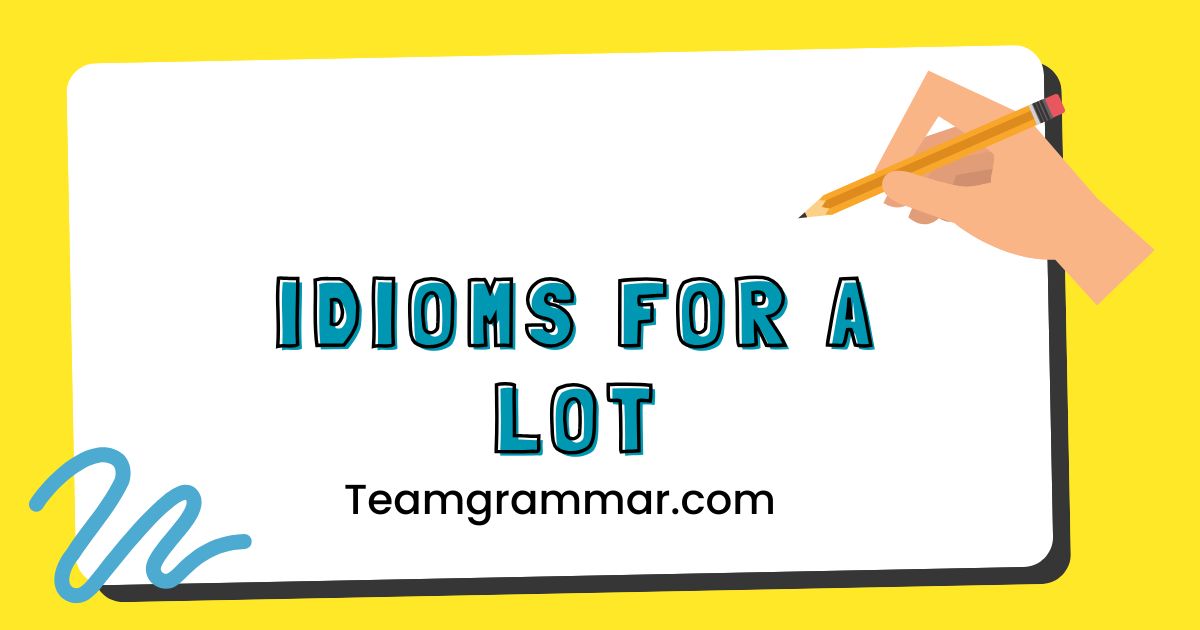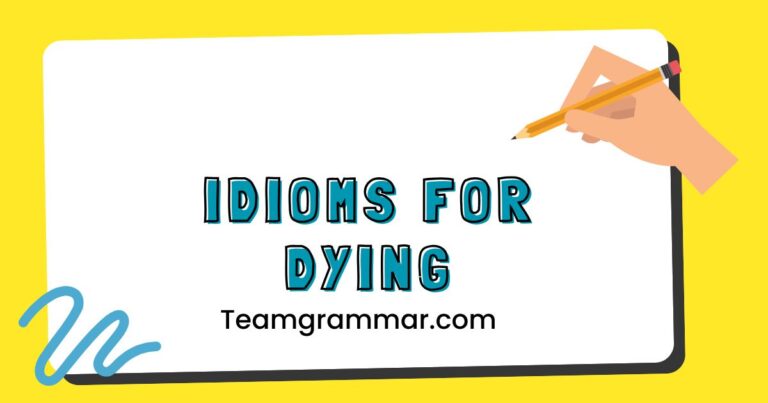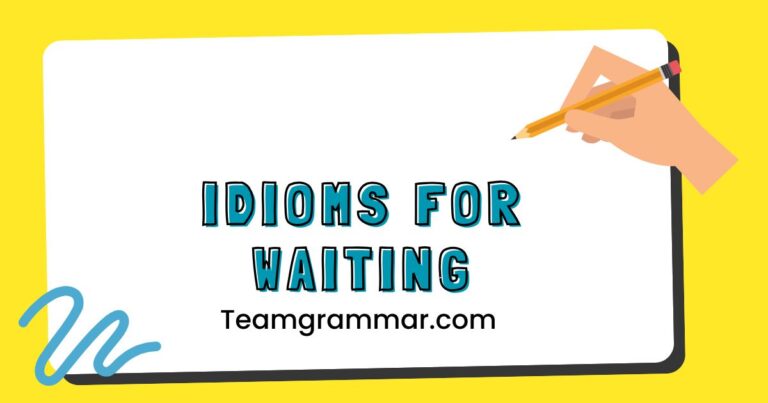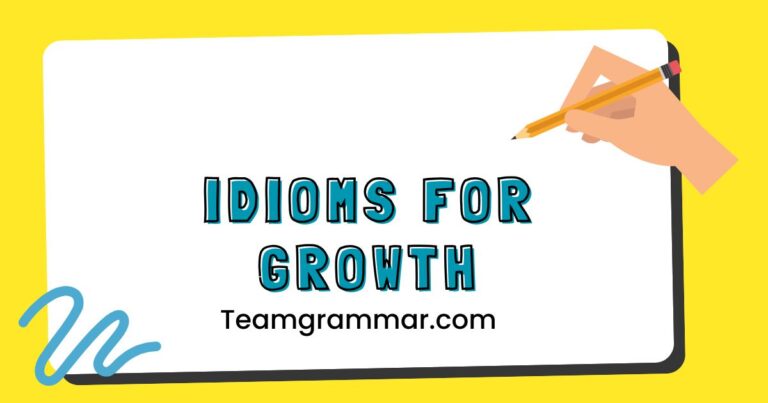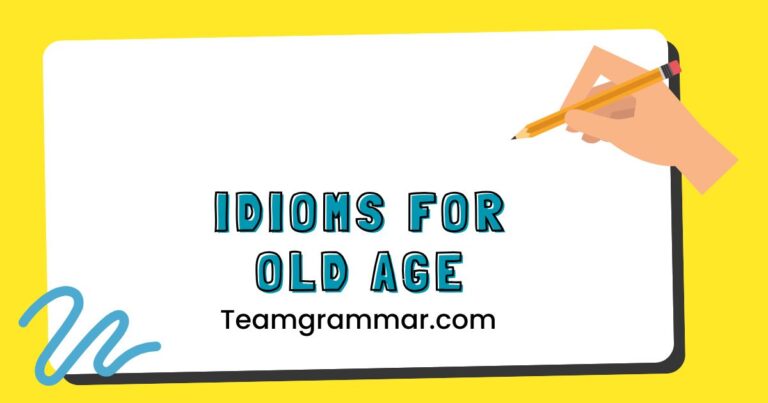47 Idioms for “A Lot”: Mastering Expressive English
Understanding and using idioms is crucial for mastering English, especially when it comes to expressing quantity. Instead of always saying “a lot,” English offers a rich variety of idiomatic expressions that can add color, nuance, and sophistication to your language.
This article explores numerous idioms that convey the idea of abundance, helping you to communicate more effectively and understand native speakers with greater ease. Whether you’re a beginner aiming to expand your vocabulary or an advanced learner seeking to refine your expressive abilities, this guide provides comprehensive explanations, examples, and practice exercises to enhance your fluency.
This article is designed for English language learners of all levels, from beginners to advanced. It provides a structured approach to understanding and using idioms that express the concept of “a lot.” By the end of this article, you will be able to recognize, understand, and appropriately use a wide range of idioms to express abundance in various contexts.
Table of Contents
- Introduction
- Definition of Idioms for “A Lot”
- Structural Breakdown
- Types and Categories of Idioms for “A Lot”
- Examples of Idioms for “A Lot”
- Usage Rules for Idioms
- Common Mistakes When Using Idioms
- Practice Exercises
- Advanced Topics
- Frequently Asked Questions
- Conclusion
Definition of Idioms for “A Lot”
Idioms are expressions whose meanings cannot be understood from the literal meanings of the individual words within them. When we talk about idioms for “a lot,” we refer to phrases that convey the idea of a large quantity, a high degree, or a significant amount of something.
These idioms are often figurative and add a layer of expressiveness to communication that a simple phrase like “a lot” might lack.
These idioms function as adverbs, adjectives, or even nouns, depending on the context. They modify verbs, nouns, or adjectives to indicate abundance.
Understanding these idioms is crucial for comprehending native English speakers and for making your own language more colorful and nuanced.
The context in which you use these idioms is essential. Some idioms are appropriate for formal settings, while others are better suited for informal conversations.
Knowing the connotations and implications of each idiom will help you choose the right expression for the situation.
Structural Breakdown
Idioms for “a lot” can take various structural forms. Some are prepositional phrases, others are verb phrases, and some are simply fixed expressions.
Understanding these structures can help you recognize and use idioms more effectively.
Here’s a breakdown of common structural elements:
- Prepositional Phrases: Many idioms consist of a preposition followed by a noun or pronoun. Examples include “loads of,” “tons of,” and “a wealth of.”
- Verb Phrases: Some idioms involve verbs that indicate abundance, such as “abound in,” “teem with,” and “overflow with.”
- Fixed Expressions: These are idioms that have a set structure and cannot be altered. Examples include “by the dozen,” “galore,” and “stacks of.”
- Noun Phrases: Some idioms use nouns to represent a large quantity, such as “a mountain of,” “a sea of,” and “an ocean of.”
The key to understanding these structures is to recognize that the literal meaning of the words is less important than the overall meaning of the phrase. For example, “a sea of faces” doesn’t literally mean there’s an ocean of faces; it means there are many faces.
Types and Categories of Idioms for “A Lot”
Idioms for “a lot” can be categorized based on the specific nuance they convey. Here are some primary categories:
General Abundance
These idioms express a general sense of having a lot of something, without necessarily specifying the exact quantity. They are versatile and can be used in various contexts.
Large Quantity
These idioms emphasize a significant numerical amount. They are often used when you want to highlight the sheer volume or number of something.
High Degree or Intensity
These idioms indicate that something is present to a great extent or intensity. They are often used to describe feelings, qualities, or characteristics.
Numerous Instances or Occurrences
These idioms suggest that something happens frequently or occurs in many instances. They are useful for describing repeated actions or events.
Examples of Idioms for “A Lot”
Here are some examples of idioms for “a lot,” organized by category:
General Abundance Examples
The following table provides examples of idioms expressing general abundance, along with example sentences and explanations to illustrate their usage.
| Idiom | Example Sentence | Explanation |
|---|---|---|
| Loads of | She has loads of friends from college. | A large number of; many. |
| Tons of | I have tons of work to do before the deadline. | A great amount of; much. |
| A wealth of | The library contains a wealth of information on various topics. | A large amount or supply of something valuable. |
| Oodles of | The bakery had oodles of delicious pastries. | A very great quantity; plenty. |
| Plenty of | There’s plenty of food for everyone at the party. | More than enough; a sufficient amount. |
| A good deal of | He spent a good deal of time studying for the exam. | A significant amount or quantity. |
| A great deal of | She has a great deal of experience in the field. | A large amount; much. |
| Piles of | There were piles of books on his desk. | A large quantity arranged in a heap. |
| Reams of | The company produced reams of paperwork. | A large quantity, especially of writing. |
| Heaps of | They received heaps of praise for their performance. | A large quantity; a lot. |
| Sacks of | The farmers harvested sacks of potatoes. | A large quantity contained in sacks. |
| Scads of | There are scads of stars visible on a clear night. | A large number or amount. |
| A mountain of | He had a mountain of laundry to do. | A large quantity or amount, especially of something difficult or unpleasant. |
| A sea of | The stadium was filled with a sea of cheering fans. | A large expanse or quantity of something. |
| An abundance of | The garden had an abundance of flowers. | A large quantity; more than enough. |
| A cornucopia of | The farmer’s market offered a cornucopia of fresh produce. | A large amount or variety of something. |
| A profusion of | The artist used a profusion of colors in her painting. | An abundance or large quantity of something. |
| A surplus of | The company had a surplus of inventory at the end of the year. | An amount of something left over when requirements have been met; an excess of production or supply over demand. |
| A plethora of | The website offered a plethora of options to choose from. | A large or excessive amount of something. |
| A hoard of | The dragon guarded a hoard of gold and jewels. | A stock or store of money or valued objects, typically one that is secret or carefully guarded. |
| A treasure trove of | The antique shop was a treasure trove of vintage items. | A store of valuable or delightful things. |
| A lode of | The mine contained a lode of precious minerals. | A rich source or supply of something. |
| A stockpile of | The government maintained a stockpile of essential supplies. | A large accumulation of goods or materials, especially for use in an emergency. |
| A cache of | The explorers discovered a cache of ancient artifacts. | A collection of items of the same type stored in a hidden or inaccessible place. |
| A reservoir of | The actor had a reservoir of emotional depth to draw from. | A large or abundant source of something. |
| A fund of | The professor had a fund of knowledge on the subject. | A supply or source of something. |
| Galore | There were prizes galore at the carnival. | In abundance; plentiful. |
Large Quantity Examples
The following table provides examples of idioms specifically indicating a large numerical quantity, offering both context and clarity for effective usage.
| Idiom | Example Sentence | Explanation |
|---|---|---|
| By the dozen | The bakery sells cookies by the dozen. | In groups of twelve. |
| Hundreds of | Hundreds of people attended the concert. | A large number; more than two hundred. |
| Thousands of | Thousands of stars are visible in the night sky. | A very large number; more than one thousand. |
| Millions of | The company earned millions of dollars in revenue. | A vast number; more than one million. |
| Billions of | There are billions of stars in the galaxy. | An extremely large number; more than one billion. |
| A multitude of | The choices offered were a multitude of options. | A large number of things or people. |
| A swarm of | A swarm of bees flew into the garden. | A large number of insects or other small creatures, especially when in motion. |
| A host of | There was a host of problems that needed to be addressed. | A large number of people or things. |
| A legion of | The company had a legion of loyal customers. | A vast number of people or things. |
| A troop of | A troop of monkeys swung through the trees. | A group of animals or people. |
| A galaxy of | The awards ceremony attracted a galaxy of stars. | A large and impressive group of people or things. |
| A cluster of | A cluster of houses stood on the hilltop. | A group of things or people close together. |
| A collection of | She has a collection of rare stamps. | A group of things or people that have been gathered together. |
| A batch of | The baker made a batch of cookies. | A quantity of something produced at one time. |
| A string of | The city experienced a string of robberies. | A series of similar or related things. |
| A chain of | The company owns a chain of restaurants. | A series of interconnected things or establishments. |
| A range of | The store offers a range of products to suit all tastes. | A variety of things of a particular type. |
| A spectrum of | The project covered a spectrum of topics. | A wide range of related ideas, qualities, or activities. |
| A battery of | The lawyer faced a battery of questions from the press. | A large number of things of a particular kind, typically questions or tests. |
| A barrage of | The boxer endured a barrage of punches. | A rapid or overwhelming outpouring of things. |
| A volley of | The troops unleashed a volley of gunfire. | A simultaneous discharge of a number of firearms. |
| A fusillade of | The critics fired a fusillade of negative reviews. | A series of shots fired or missiles thrown all at the same time or in quick succession. |
| A hail of | The car was hit by a hail of stones. | A large number of objects falling or hurled at the same time. |
| A shower of | The bride received a shower of gifts. | A large number of things that fall or are thrown or given. |
| A flood of | The company received a flood of applications. | A large quantity of something arriving rapidly and in force. |
| A wave of | The country experienced a wave of immigration. | A sudden increase in a particular activity or phenomenon. |
| A surge of | There was a surge of interest in the topic. | A sudden large increase, typically temporary. |
High Degree or Intensity Examples
The following table provides examples of idioms that express a high degree or intensity, complete with illustrative sentences and detailed explanations.
| Idiom | Example Sentence | Explanation |
|---|---|---|
| Madly in love | They are madly in love with each other. | Extremely or intensely in love. |
| Deeply affected | She was deeply affected by the tragic news. | Strongly or profoundly influenced. |
| Highly successful | He is highly successful in his career. | Very successful; achieving a great deal. |
| Intensely focused | She was intensely focused on her work. | Concentrating very hard; extremely attentive. |
| Profoundly grateful | We are profoundly grateful for your support. | Deeply thankful; extremely appreciative. |
| Blissfully ignorant | They were blissfully ignorant of the danger. | Completely unaware and happy. |
| Utterly devastated | He was utterly devastated by the loss. | Completely destroyed or ruined. |
| Completely exhausted | After the marathon, she was completely exhausted. | Totally worn out; extremely tired. |
| Extremely delighted | They were extremely delighted with the results. | Very pleased; overjoyed. |
| Terribly sorry | I am terribly sorry for the mistake. | Very regretful; deeply apologetic. |
| Absolutely certain | I am absolutely certain that I saw him. | Completely sure; without a doubt. |
| Perfectly clear | It is perfectly clear what needs to be done. | Completely obvious; easily understood. |
| Intensely painful | The injury was intensely painful. | Causing a great deal of pain; excruciating. |
| Exceedingly difficult | The task was exceedingly difficult to complete. | Extremely hard; very challenging. |
| Overwhelmingly positive | The response to the new product was overwhelmingly positive. | Extremely favorable; largely approving. |
| Unbelievably beautiful | The scenery was unbelievably beautiful. | Extremely attractive; stunning. |
| Incredibly talented | She is incredibly talented as a musician. | Extremely skilled; highly gifted. |
| Remarkably similar | The two paintings were remarkably similar. | Strikingly alike; notably resembling. |
| Notably different | The two approaches were notably different. | Significantly distinct; clearly differing. |
| Strikingly obvious | The solution was strikingly obvious once we saw it. | Very clear; easily noticeable. |
| Significantly improved | The patient’s condition has significantly improved. | Noticeably better; considerably enhanced. |
| Substantially reduced | The price has been substantially reduced. | Significantly lowered; considerably diminished. |
| Considerably larger | The new office is considerably larger than the old one. | Significantly bigger; substantially greater. |
| A great deal more | There is a great deal more to learn about the subject. | Much more; significantly more. |
| Far more | The new car is far more efficient than the old one. | Much more; considerably more. |
| Much more | There is much more to the story than you know. | A significantly greater amount or degree. |
| Way more | That costs way more than I can afford. | Considerably more; significantly greater. |
Numerous Instances or Occurrences Examples
The following table shows idioms describing numerous instances or occurrences, complete with example sentences and explanations for clarity.
| Idiom | Example Sentence | Explanation |
|---|---|---|
| Time and again | He has warned them time and again about the dangers. | Repeatedly; very often. |
| Over and over | She practiced the song over and over until she perfected it. | Repeatedly; again and again. |
| Again and again | They made the same mistake again and again. | Repeatedly; many times. |
| Day in and day out | He works day in and day out to provide for his family. | Every day; continuously. |
| Year after year | The festival is held year after year in the same location. | Every year; annually. |
| On numerous occasions | He has helped us on numerous occasions. | Many times; frequently. |
| In many instances | The rule was broken in many instances. | Frequently; in several cases. |
| More often than not | More often than not, he arrives late to meetings. | Usually; most of the time. |
| As often as not | As often as not, the weather is unpredictable. | Frequently; quite often. |
| Frequently | She frequently visits her grandparents. | Often; regularly. |
| Regularly | He exercises regularly to stay in shape. | At regular intervals; frequently. |
| Constantly | The phone is constantly ringing. | Continuously; all the time. |
| Repeatedly | He repeatedly asked the same question. | Again and again; many times. |
| Continuously | The rain fell continuously for three days. | Without stopping; constantly. |
| Perpetually | He is perpetually late for appointments. | Always; constantly. |
| Incessantly | The baby cried incessantly throughout the night. | Without interruption; constantly. |
| Infinitely | The possibilities are infinitely diverse. | Limitlessly; endlessly. |
| Endlessly | The debate seemed to go on endlessly. | Without end; continuously. |
| Countless times | He has told the story countless times. | Very many times; too many to count. |
| Innumerable occasions | There have been innumerable occasions when he has helped us. | Too many to be counted; very many. |
| Again and again and again | She tried again and again and again to solve the puzzle. | Repeatedly; many, many times. |
| Time after time | Time after time, he proved himself to be reliable. | Repeatedly; on many occasions. |
| Every now and then | Every now and then, we go out for dinner. | Occasionally; from time to time. |
| From time to time | From time to time, she likes to visit the museum. | Occasionally; sometimes. |
| Once in a while | Once in a while, we treat ourselves to a movie. | Occasionally; sometimes. |
| Every so often | Every so often, he calls to check in. | Occasionally; at intervals. |
Usage Rules for Idioms
Using idioms correctly requires understanding their specific contexts and connotations. Here are some general rules to follow:
- Context Matters: Always consider the context in which you are using the idiom. Some idioms are formal, while others are informal. Using an informal idiom in a formal setting can sound inappropriate.
- Know the Meaning: Make sure you fully understand the meaning of the idiom before using it. Using an idiom incorrectly can lead to confusion or miscommunication.
- Consider Your Audience: Be mindful of your audience. If you are speaking to non-native English speakers, it may be best to avoid idioms altogether, or to explain them clearly.
- Don’t Overuse: While idioms can add color to your language, overusing them can make your speech sound unnatural or forced.
- Vary Your Language: Don’t rely solely on idioms to express abundance. Use a mix of idioms and more straightforward language to keep your communication clear and engaging.
It’s also important to note that some idioms have regional variations. An idiom that is common in one part of the English-speaking world may be unfamiliar in another.
If you are unsure about an idiom, it’s always best to err on the side of caution and use a more straightforward expression.
Common Mistakes When Using Idioms
One common mistake is to interpret idioms literally. For example, someone might misunderstand “loads of” to mean actual loads, rather than a large quantity.
Another mistake is to mix up similar idioms or to alter them incorrectly. Here are some examples of common mistakes and their corrections:
| Incorrect | Correct | Explanation |
|---|---|---|
| I have a lot of loads to do. | I have loads of work to do. | “Loads of” is the idiom; “a lot of loads” is not. |
| She has tons of friends a lot. | She has tons of friends. | Do not add “a lot” to the idiom. |
| He spent a good deal of times. | He spent a good deal of time. | “Time” should be singular in this context. |
| There are plenty foods. | There is plenty of food. | Use “plenty of” with uncountable nouns. |
| She is very madly in love. | She is madly in love. | “Madly” already implies a high degree. |
| He is deeply affecting. | He is deeply affected. | Use the correct form of the verb. |
| They are time and a time. | They are time and again. | Correct the idiom. |
| He helped us in many occasion. | He helped us on numerous occasions. | Correct phrase and add ‘s’. |
| I am extreme delighted. | I am extremely delighted. | Correct adverb for ‘delighted’. |
Another frequent error is using idioms in the wrong register. For instance, using “scads of” in a formal report would be inappropriate.
Always consider your audience and the formality of the situation.
Practice Exercises
Test your understanding of idioms for “a lot” with these exercises.
Exercise 1: Fill in the Blanks
Fill in the blanks with the appropriate idiom from the list below.
(Loads of, Tons of, A wealth of, Oodles of, Plenty of)
| Question | Answer |
|---|---|
| 1. She has ________ experience in marketing. | A wealth of |
| 2. There are ________ opportunities for growth in this company. | Plenty of |
| 3. The kids received ________ presents for Christmas. | Loads of |
| 4. I have ________ homework to do tonight. | Tons of |
| 5. The bakery sells ________ delicious pastries every day. | Oodles of |
| 6. The library offers ________ resources for students. | A wealth of |
| 7. He has ________ time to finish the project. | Plenty of |
| 8. They have ________ clothes in their wardrobe. | Loads of |
| 9. We have ________ work to complete before the deadline. | Tons of |
| 10. The restaurant serves ________ tasty dishes. | Oodles of |
Exercise 2: Multiple Choice
Choose the correct idiom to complete each sentence.
| Question | Options | Answer |
|---|---|---|
| 1. There are ________ stars in the sky. | a) Hundreds of b) Few of c) Some of | a) Hundreds of |
| 2. The company earned ________ dollars last year. | a) Millions of b) Several of c) A couple of | a) Millions of |
| 3. She has warned him ________ about the dangers. | a) Time and again b) Once or twice c) Rarely | a) Time and again |
| 4. He works ________ to support his family. | a) Day in and day out b) Now and then c) Occasionally | a) Day in and day out |
| 5. They are ________ in love. | a) Madly b) Slightly c) Somewhat | a) Madly |
| 6. She was ________ by the news. | a) Deeply affected b) Mildly affected c) Slightly affected | a) Deeply affected |
| 7. The bakery sells cookies ________. | a) By the dozen b) By the piece c) By the pound | a) By the dozen |
| 8. There was ________ problems that needed to be addressed. | a) A host of b) A few c) Some | a) A host of |
| 9. He is ________ successful in his career. | a) Highly b) Slightly c) Somewhat | a) Highly |
| 10. She practiced the song ________ until she perfected it. | a) Over and over b) Once or twice c) Seldom | a) Over and over |
Exercise 3: Sentence Completion
Complete each sentence using an appropriate idiom that means “a lot.”
| Question | Answer |
|---|---|
| 1. The garden had ________ flowers in bloom. | an abundance of |
| 2. The antique shop was ________ vintage items. | a treasure trove of |
| 3. The mine contained ________ precious minerals. | a lode of |
| 4. The awards ceremony attracted ________ stars. | a galaxy of |
| 5. The lawyer faced ________ questions from the press. | a battery of |
| 6. The city experienced ________ robberies. |
a string of |
| 7. The store offers ________ products to suit all tastes. | a range of |
| 8. The patient’s condition has ________. | significantly improved |
| 9. The new office is ________ than the old one. | considerably larger |
| 10. There is ________ to learn about the subject. | a great deal more |
Advanced Topics
For advanced learners, exploring the etymology and historical context of idioms can provide a deeper understanding of their usage. Additionally, analyzing how idioms are used in literature and media can offer insights into their cultural significance.
- Etymology: Research the origins of idioms to understand how their meanings have evolved over time.
- Cultural Context: Explore how cultural values and beliefs are reflected in idioms.
- Literary Analysis: Examine how authors use idioms to create vivid imagery and convey complex ideas.
- Media Usage: Analyze how idioms are used in news, advertising, and entertainment to influence audiences.
Understanding these advanced topics can elevate your command of the English language and enable you to use idioms with greater precision and confidence.
Frequently Asked Questions
Conclusion
Mastering idioms for “a lot” can significantly enhance your English language skills, allowing you to express abundance with greater precision and flair. By understanding the different types of idioms, their structural breakdown, and usage rules, you can communicate more effectively and confidently in various contexts.
Remember to practice regularly, pay attention to context, and be mindful of your audience. With dedication and perseverance, you can incorporate these colorful expressions into your vocabulary and elevate your overall command of the English language.

